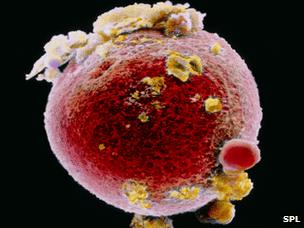Unlimited human eggs 'potential' for fertility treatment
- Published

Researchers say stem cells in ovaries may one day improve fertility treatment
It may be possible to one day create an "unlimited" supply of human eggs to aid fertility treatment, US doctors say.
Researchers have shown it is possible to find stem cells in adult women which spontaneously produced new eggs in the laboratory.
Further experiments on mice showed such eggs could be fertilised, according to a .
One British expert said the study re-wrote the rule book with "exciting possibilities" for improving fertility.
The long-established theory is that women are born with all the eggs they will ever have. Lead researcher Dr Jonathan Tilly, from Massachusetts General Hospital, said this study, , disproves that.
His team has reported finding and isolating the stem cells which go on to produce eggs in the ovaries of reproductive age women. It was done by searching for a protein, DDX4, which was unique to the surface of the stem cells. This allowed researchers to fish out the right cells.
When grown in the laboratory, the cells "spontaneously generated" immature eggs - or oocytes, which looked and acted like oocytes in the body.
The cells were "matured" when surrounded by living human ovarian tissue, which had been grafted inside mice.
There are tight legal and ethical restrictions on research on human eggs. The same experiments repeated using stem cells taken from mice showed the eggs could be fertilised with sperm and produced embryos.
'Unprecedented'
Dr Tilly said: "The primary objective of the current study was to prove that oocyte-producing stem cells do in fact exist in the ovaries of women during reproductive life, which we feel this study demonstrates very clearly.
"The discovery of oocyte precursor cells in adult human ovaries, coupled with the fact that these cells share the same characteristic features of their mouse counterparts that produce fully functional eggs, opens the door for development of unprecedented technologies to overcome infertility in women and perhaps even delay the timing of ovarian failure."
He told Nature: "These cells, when maintained outside of the body, are more than happy to make cells on their own and if we can guide that process I think it opens up the chance that sometime in the future we might get to the point of having an unlimited source of human eggs."
Dr Allan Pacey, a fertility expert at the University of Sheffield, said: "This is a nice study which shows quite convincingly that women's ovaries contain stem cells that can divide and make eggs.
"Not only does this re-write the rule book, it opens up a number of exciting possibilities for preserving the fertility of women undergoing treatment for cancer, or just maybe for women who are suffering infertility by extracting these cells and making her new eggs in the lab."
'Potential landmark'
Stuart Lavery, a consultant gynaecologist and director of IVF at Hammersmith Hospital, said the findings were "extremely significant" and "a potentially landmark piece of research".
He told the “óĻó“«Ć½: "If this research is confirmed it may overturn one of the great asymmetries of reproductive biology - that a woman's reproductive pool of gametes may be renewable, just like a man's."
While cautioning that the cells were "some way" from any clinical use, Mr Lavery said they had potential, "particularly in young women facing sterilising treatment such as chemotherapy".
- Published28 October 2010
- Published27 October 2011